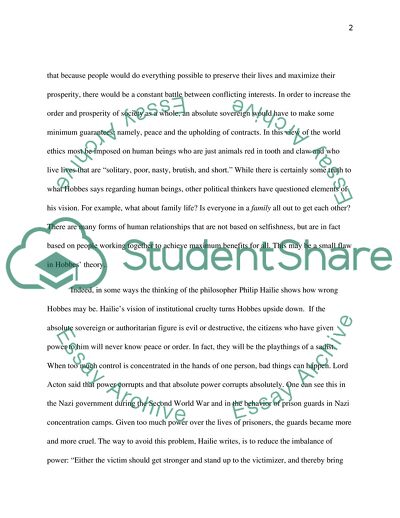
- Home
- Free Samples
- Premium Essays
- Editing Services
- Extra Tools
- Essay Writing Help
- About Us
- Studentshare
- Subjects
- Miscellaneous
- Ethics: is an authoritarian figure necessary for this world
Ethics: is an authoritarian figure necessary for this world - Essay Example

- Subject: Miscellaneous
- Type: Essay
- Level: Undergraduate
- Pages: 4 (1000 words)
- Downloads: 0
- Author: hlubowitz
Extract of sample "Ethics: is an authoritarian figure necessary for this world"
In this essay I will briefly discuss the views of three philosophers on this important question. Thomas Hobbes is most famous for his book Leviathan. In it he argued that a “war of all against all” existed in nature and that people were mostly motivated by fear and distrust and that peoples’ motivations all conflicted with each other. The only way for order to prevail, Hobbes argued, would be through an absolute sovereign. Only a figure of immense power could guarantee the sorts of contracts people required with one another to live in peace.
As Hobbes wrote, “The passions that incline men to peace, are fear of death; desire of such things as are necessary to commodious living; and a hope by their industry to obtain them” (46). He believed that because people would do everything possible to preserve their lives and maximize their prosperity, there would be a constant battle between conflicting interests. In order to increase the order and prosperity of society as a whole, an absolute sovereign would have to make some minimum guarantees: namely, peace and the upholding of contracts.
In this view of the world ethics most be imposed on human beings who are just animals red in tooth and claw and who live lives that are “solitary, poor, nasty, brutish, and short.” While there is certainly some truth to what Hobbes says regarding human beings, other political thinkers have questioned elements of his vision. For example, what about family life? Is everyone in a family all out to get each other? There are many forms of human relationships that are not based on selfishness, but are in fact based on people working together to achieve maximum benefits for all.
This may be a small flaw in Hobbes’ theory. Indeed, in some ways the thinking of the philosopher Philip Hailie shows how wrong Hobbes may be. Hailie’s vision of institutional cruelty turns Hobbes upside down. If the absolute sovereign or authoritarian
...Download file to see next pages Read MoreCHECK THESE SAMPLES OF Ethics: is an authoritarian figure necessary for this world
The Impact of Cultural Differences on the HRM of Foreign Companies in China
Analysis of Important Project Management Factors
Human Resource Development Strategies
Niccolo Machiavelli
The Impact on Christianity in Europe in the 19th Century
Pay and HRM Ethics
Analysis of Important Project Management Factors
Max Weber: A Biography

- TERMS & CONDITIONS
- PRIVACY POLICY
- COOKIES POLICY